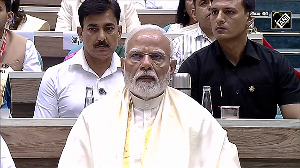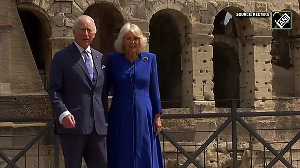Former Mumbai police commissioner R S Sharma on Thursday questioned the applicability of the Maharashtra Control of Organised Crime Act in the multicrore stamp paper scam.
Sharma's advocate argued that prime accused Abdul Karim Telgi and Sharma were wrongly booked under the stringent law.
Sharma had earlier filed a petition challenging his arrest under MCOCA and constitutional validity of the act, but today he amended it by questioning the applicability of this law on him and others.
Justice V G Palshikar and Justice P V Kakade took on record his amended plea and posted the matter for further hearing on January 22. On the same day, the judges would fix a date for final hearing of Sharma's petition.
In another development, Advocate General Goolam Vahanvati assured the court that SIT would not seek further police custody of Sharma till January 22 when his plea for interim relief would be heard. Sharma has urged the court to restrain special investigating team from seeking his further police custody. He is currently in jail custody in Pune.
Deputy Secretary (home) N R Shere filed an affidavit opposing Sharma's plea for interim relief. He said Sharma's petition was not tenable in law and should be dismissed.
Shere said the high court had earlier upheld the validity of MCOCA in the Bharat Shah case and other cases too.
The affidavit said that police was empowered under section 21(7) of MCOCA to seek police custody of an accused for investigations. Granting Sharma interim relief would cause great prejudice to SIT which was probing the scam on a court directive, the official said.







 © 2025
© 2025